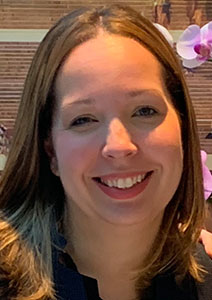
Case Western Reserve researcher studying how simple tools and practices to improve sleep may help young adults with Type 1 diabetes control their blood sugar
A Case Western Reserve nurse scientist is studying the critical role that regular restful sleep may play in better controlling Type 1 diabetes for young adults living on their own for the first time.

"We know that sleep is important for all of us, of course, but we believe that this group of young adults is unique for this study and we believe that we can help," said Stephanie Griggs, an assistant professor at the Frances Payne Bolton School of Nursing, who is leading the research. "Many people think that sleep just happens to you, but in reality, it takes effort to have healthy sleep. This is even more critical when you have a lifelong health issue."
Type 1 diabetes is a chronic (lifelong) health condition for which there is no cure and is the seventh leading cause of death in the United States, according to the Centers for Disease Control.
Type 1 diabetes is believed to be caused by an autoimmune reaction (the body attacks itself) that stops a person's pancreas from making insulin-which allows glucose to enter the body's cells to provide energy. This type of diabetes affects about 1.6 million people nationally-and is projected to increase to 5 million by 2050.
Type 1 is more often diagnosed in childhood or earlier than its counterpart, Type 2 diabetes, which is usually diagnosed in adults over 40 and linked more directly to weight, inactivity and age.
Griggs and colleagues will equip a group of young adults with Type 1 diabetes and other criteria with several simple, but critical, methods to help get restful sleep.
The health benefits of sleep are well documented, Griggs said: It restores the mind and body, repairs blood vessels and regulates blood sugar-critical for a person with diabetes.
The work is supported by a three-year, $728,912 grant from the National Institute of Nursing Research (NINR), part of the National Institutes of Health (NIH).
The funding is from the NINR's Pathway to Independence program, which provides support for nurse scientists, especially in areas which "promote and improve the health of individuals, families, and communities."
"This is a highly competitive NIH award geared toward launching research careers for the most promising early career faculty," said Ronald Hickman Jr., associate dean for research and Ruth M. Anderson Professor of Nursing. Hickman said Griggs is believed to be the first recipient from the nursing school.
Hickman, who is also a collaborator on the project, added that Grigg's exploration of the interplay between sleep and diabetes self-management is "innovative and has potential to significantly impact the health and well-being of an often overlooked group of Americans, young adults living with Type I diabetes."
Griggs and her team will enroll 48 participants for the study-all now living on their own for the first time and diagnosed with having Type 1 diabetes for at least six months.
The new study will begin with what Griggs calls "motivational interviewing" to assist young adults in setting personal sleep goals, whose sleep patterns will be monitored by the researchers over three months.
The study will also recommend that the participants create a cool, dark atmosphere for sleeping and consider the addition of sleep-promoting activities like guided imagery, progressive muscle relaxation and breathing exercises. Researchers will recommend that participants limit "blue-light" devices like cell phones at night and avoid caffeine consumption late in the day.
"We often focus on diet and exercise for managing diabetes for people of all ages, which is very important, but sleep is a neglected topic," said Griggs, who specializes in the role of sleep and the circadian system in chronic childhood conditions.
She said her previous research led her to consider studying and helping people who must self-manage their diabetes. "When I first began to talk to young people with Type 1 diabetes about this," she said, "many would say 'Nobody has ever asked me about sleep,' and that was eye opening."
She said young adults with Type 1 diabetes achieve blood-sugar targets at the lowest rate and have unique needs to maintain their health.
"There may be a number of reasons for this," Griggs said. "They're away from parents or the home they grew up in, for the first time; some may no longer have health insurance or high out-of-pocket costs; and some may be struggling with just the weight of a lifelong effort to manage their diabetes.
"This is a 24/7 condition that they didn't ask for, and as one of the participants in my research said: 'I have my whole life to have diabetes-but I'm only in college once.' "
Others involved in the work are Hickman and Kingman Strohl, a sleep expert from the Case Western Reserve School of Medicine and University Hospitals.






